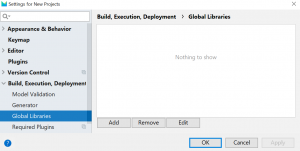The mbeddr RCP is great, because it gives you a focused MPS-based IDE, including mbeddr.platform, which you can use to write models in the embedded software domain.
However, I find it often useful to have the mbeddr.platform plugins (which are generic pieces of functionality useful for any DSL development) available for development as a language engineer, not as someone who wants to write mbeddr models.
If you want the full-blown mbeddr development environment (which requires you to do a build of the entire mbeddr.platform and mbeddr DSL stack), just follow the mbeddr build environment setup howto.
However, I often have the use case where I just quickly want to setup an MPS distribution (e.g. for student courses or student projects) with the mbeddr DSLs included. In this case I just perform an easy procedure:
- Look on the mbeddr.core github releases page for the latest nightly build
- Determine which MPS major and minor versions are used by the latest nightly build:
- For a specific release on the releases page, download the source code (e.g. zip file)
- Look in the upper subdirectory of the zip for the file called build.gradle. There is a line in this file that starts with ext.mpsBuild =, e.g.: ext.mpsBuild = “2017.3.4”. The version number is the specific MPS build that this mbeddr nightly is using.
- In the same build.gradle file, there is a line that starts with ext.mpsMajor =, e.g. ext.mpsMajor = “2017.3”. This is the MPS major version used.
- Download the unified package (zip-file) of the MPS version you found in build.gradle. Currently the MPS download links are nicely formatted like this: https://download.jetbrains.com/mps/<mpsMajor>/MPS-<mpsBuild>.zip.
So, e.g. for MPS 2017.3.4 you can manually construct the download URL (which will be https://download.jetbrains.com/mps/2017.3/MPS-2017.3.4.zip) and then use your favorite download tool (e.g. wget or your browser) to download it. - From the mbeddr releases page, download, depending on what you need:
- com.mbeddr.allInOne.zip (full mbeddr distribution including mbeddr.platform and embedded development DSLs)
- platform-distribution.zip (mbeddr.platform only).
- Unzip the MPS zip (extract here, this will create a subfolder called MPS <mpsMajor>, e.g. MPS 2017.3) and then unzip the chosen mbeddr zip (either com.mbeddr.allInOne.zip or platform-distribution.zip) into the MPS folder (which places all the mbeddr plugins into the plugins subdirectory of your MPS folder).
- Inside your MPS folder, copy all the files from bin/<platform> (where <platform> is the platform you work on: win, Linux, or mac) one directory up (so the executables for your platform end up in the bin directory).
- Either set a command line variable called MPS_JDK which points to your Java JDK installation, or edit your relevant launcher file (e.g. for Windows this is bin/mps.bat) and locate the line where JDK= is set and put your JDK path there).
Additional info on 25 July 2018: JetBrains nowadays uses a self-maintained JDK for MPS. So far I haven’t been able to find it on the JetBrains site, but Itemis provides downloads of these JDKs for all three platforms (Linux, Windows, Mac) at https://projects.itemis.de/nexus/, e.g.:
* https://projects.itemis.de/nexus/service/local/repositories/mbeddr/content/com/jetbrains/jdk/jdk/8u152b851.2/jdk-8u152b851.2-windows_x64.tgz
* https://projects.itemis.de/nexus/service/local/repositories/mbeddr/content/com/jetbrains/jdk/jdk/8u152b851.2/jdk-8u152b851.2-linux_x64.tgz
Additional info on 29 July 2018: Instead of unzipping mbeddr plugins into MPS, you can also just install a native version of MPS (using setup.exe or the Linux or Mac installation package) and then use global libraries to point to the mbeddr plugins:
